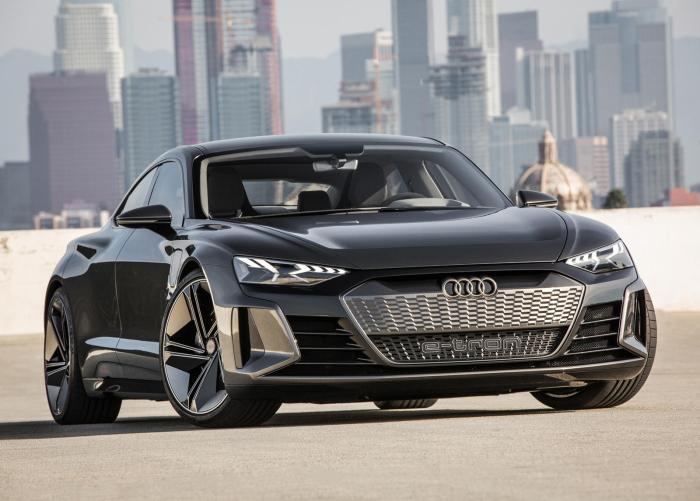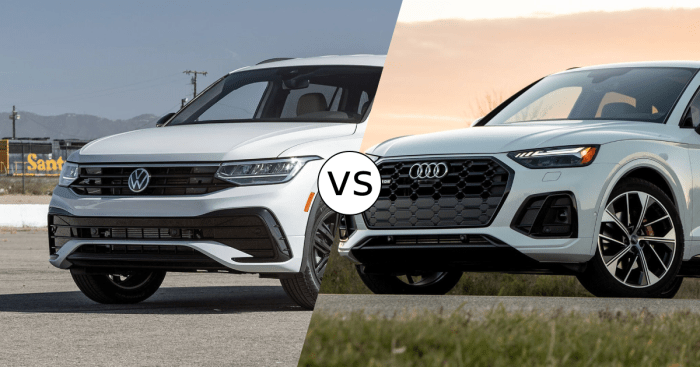Did Volkswagen buy Audi? The answer is a resounding yes, and this strategic acquisition has significantly shaped the automotive industry. In this exploration, we delve into the circumstances, motivations, and impact of this merger, uncovering the synergies, challenges, and future implications for both Volkswagen and Audi.
The acquisition of Audi by Volkswagen marked a turning point in the automotive landscape, creating a formidable force that has influenced market dynamics and innovation. This merger has sparked numerous questions and discussions, and we aim to address some of the most frequently asked questions about this pivotal event.
Acquisition History
Volkswagen’s acquisition of Audi, a renowned German luxury car manufacturer, marked a significant chapter in the automotive industry. The acquisition was driven by strategic motivations and a desire to expand Volkswagen’s portfolio and enhance its competitive position.
Did Volkswagen buy Audi? Yes, they did. The two automakers have been working together for decades, and Audi is now a wholly-owned subsidiary of Volkswagen. This has led to some shared technology between the two brands, but Audi cars are still generally considered to be more reliable than Volkswagens.
If you’re considering buying a Volkswagen, you may want to read this article about are Volkswagens reliable before making a decision.
The acquisition process unfolded over several years, with key milestones and events shaping the outcome. In 1964, Volkswagen acquired a 50% stake in Auto Union, the parent company of Audi. This initial investment provided Volkswagen with a foothold in the luxury car market and laid the foundation for future collaborations.
Volkswagen’s Motivations
Volkswagen’s acquisition of Audi was driven by several strategic motivations. Firstly, Volkswagen sought to expand its product portfolio and enter the growing luxury car segment. Audi’s reputation for engineering excellence and technological innovation made it an attractive acquisition target.
Secondly, Volkswagen aimed to strengthen its position in the global automotive market. By acquiring Audi, Volkswagen gained access to new markets and customer segments, particularly in Europe and Asia.
Impact of the Acquisition
The acquisition of Audi had a significant impact on both Volkswagen and Audi. For Volkswagen, the acquisition provided access to Audi’s advanced technology and engineering capabilities. This allowed Volkswagen to enhance the quality and performance of its own vehicles.
For Audi, the acquisition provided financial stability and access to Volkswagen’s extensive resources. This enabled Audi to invest in research and development, expand its product line, and establish itself as a leading player in the luxury car market.
Strategic Rationale: Did Volkswagen Buy Audi

Volkswagen’s acquisition of Audi in 1964 was a strategic move that aimed to strengthen the company’s position in the automotive industry. The acquisition provided Volkswagen with several benefits and synergies, including:
Product Portfolio Expansion
- Audi’s luxury vehicles complemented Volkswagen’s mass-market offerings, allowing the company to cater to a broader range of customers.
- Audi’s technological advancements, such as its quattro all-wheel drive system, enhanced Volkswagen’s product lineup and increased its appeal to performance-oriented buyers.
Synergies in Production and Distribution
- Volkswagen and Audi shared production platforms and components, resulting in cost savings and increased efficiency.
- The combined distribution network allowed Volkswagen to expand its reach and improve its market penetration.
Increased Brand Value and Prestige
- Audi’s reputation for luxury and innovation enhanced Volkswagen’s brand image and elevated its perceived quality.
- The association with Audi helped Volkswagen establish itself as a more premium automaker.
Challenges and Risks, Did volkswagen buy audi
- The integration of two distinct corporate cultures and management styles posed challenges for Volkswagen.
- The acquisition required significant financial resources and could potentially strain Volkswagen’s financial position.
- The merger could lead to internal competition between Volkswagen and Audi brands, potentially diluting their respective market positions.
Despite these challenges, Volkswagen’s acquisition of Audi proved to be a successful strategic move that strengthened the company’s position in the automotive industry and created significant long-term value for its shareholders.
It’s worth noting that Volkswagen acquired Audi in 1964, making it a subsidiary. However, Volkswagen recently discontinued the Passat in North America, although it’s still available in other markets. For more information on the Passat’s discontinuation, check out this article .
Integration and Collaboration
The integration process between Volkswagen and Audi was a complex and challenging undertaking. The two companies had different cultures, operating models, and product portfolios. Volkswagen was a mass-market automaker, while Audi was a luxury brand. Volkswagen’s goal was to leverage Audi’s expertise in luxury car manufacturing, while Audi sought to gain access to Volkswagen’s global reach and economies of scale.
The integration process began with the establishment of a joint management team. This team was responsible for overseeing the integration process and ensuring that the two companies were working together effectively. The team also developed a common set of goals and objectives for the combined company.
Challenges
One of the biggest challenges in the integration process was aligning the two companies’ cultures. Volkswagen had a more traditional, hierarchical culture, while Audi had a more entrepreneurial, decentralized culture. The two companies also had different approaches to product development and marketing.
Another challenge was integrating the two companies’ operations. Volkswagen had a complex global supply chain, while Audi had a more streamlined supply chain. The two companies also had different manufacturing processes and quality control standards.
Successes
Despite the challenges, the integration process was ultimately successful. The two companies were able to align their cultures, operations, and branding. They also developed a number of successful collaborations and joint ventures.
Did Volkswagen buy Audi? Yes, they did. And if you’re curious about the reliability of Volkswagen Beetles, check out this article . Getting back to our original topic, Volkswagen acquired Audi in 1964, expanding its portfolio and solidifying its position in the automotive industry.
Collaborations
One of the most successful collaborations between Volkswagen and Audi is the development of the Volkswagen Phaeton. The Phaeton is a luxury sedan that was developed by Volkswagen using Audi’s technology and expertise. The Phaeton has been a critical and commercial success, and it has helped to boost Volkswagen’s image in the luxury car market.
Volkswagen has a long history of acquiring other car companies, including Audi in 1964. But did you know that Volkswagen also owns Bugatti, the legendary French automaker known for its hypercars? Click here to learn more about Volkswagen’s acquisition of Bugatti and its impact on the automotive industry.
Back to the topic of Audi, Volkswagen’s purchase of the company has had a significant impact on both brands, leading to the development of new models and technologies.
Another successful collaboration is the development of the Audi Q7. The Q7 is a luxury SUV that was developed by Audi using Volkswagen’s platform and technology. The Q7 has been a commercial success, and it has helped to expand Audi’s product portfolio.
Volkswagen’s acquisition of Audi in 1964 marked a significant milestone in the automotive industry. However, their buying spree didn’t stop there. In 1998, they added another Italian icon to their portfolio: Lamborghini. Like Audi, Lamborghini’s performance-oriented vehicles have a loyal following worldwide.
The question “did volkswagen buy audi” is often asked, and the answer is a resounding yes. But did you know they also own Lamborghini? Explore the fascinating history behind this iconic acquisition here .
Market Impact
Volkswagen’s acquisition of Audi significantly impacted the automotive market, altering competitive dynamics and reshaping the industry landscape.
The acquisition consolidated Volkswagen’s position as one of the world’s largest automakers, expanding its portfolio with Audi’s luxury offerings. Audi’s strong brand reputation and technological prowess complemented Volkswagen’s mass-market appeal, creating a formidable competitor in various segments.
Competitive Landscape
- Intensified competition in the luxury car market: Audi’s entry into the luxury segment challenged established players like BMW and Mercedes-Benz, leading to increased competition and innovation.
- Broadened product portfolio: Volkswagen gained access to Audi’s range of high-performance vehicles, SUVs, and sedans, diversifying its offerings and catering to a wider customer base.
- Enhanced brand perception: Audi’s premium image rubbed off on Volkswagen, elevating the perception of the entire group and attracting new customers.
Market Dynamics
- Increased market share: Volkswagen’s acquisition of Audi contributed to its increased market share, particularly in the luxury and premium segments.
- Technological advancements: Audi’s expertise in areas like quattro all-wheel drive and advanced electronics benefited Volkswagen’s overall product development, driving innovation across the group.
- Global expansion: Audi’s established presence in international markets, especially China, facilitated Volkswagen’s global expansion and strengthened its position in key regions.
Case Study
In 2018, Volkswagen Group, including Audi, sold over 10.8 million vehicles worldwide. This represented a significant increase compared to the pre-acquisition period, highlighting the positive impact on market share and global reach.
Future Outlook
Volkswagen’s acquisition of Audi has far-reaching implications for the future of both companies and the automotive industry as a whole. The combined entity now has a formidable presence in the global luxury car market, with a diverse portfolio of brands and products.
Looking ahead, there are several key opportunities and challenges that Volkswagen and Audi must navigate to ensure continued success.
One of the most significant opportunities for Volkswagen and Audi lies in the growing demand for electric vehicles. Both companies have made significant investments in electric vehicle technology, and they are well-positioned to capitalize on the shift towards electrification. Volkswagen has set a goal of becoming the world’s leading provider of electric vehicles by 2025, and Audi has committed to offering an all-electric lineup by 2033. By working together, Volkswagen and Audi can leverage their combined resources to develop and produce innovative electric vehicles that meet the needs of consumers worldwide.
Challenges
Despite the opportunities, Volkswagen and Audi also face a number of challenges in the future. One of the biggest challenges is the increasing competition in the automotive industry. The global automotive market is becoming increasingly competitive, with new entrants and established players alike vying for market share.
Volkswagen and Audi must continue to innovate and differentiate their products in order to stay ahead of the competition.
Another challenge for Volkswagen and Audi is the changing regulatory landscape. Governments around the world are implementing stricter emissions regulations, and they are also encouraging the adoption of electric vehicles. Volkswagen and Audi must adapt their product lineup and manufacturing processes to meet these new regulations.
Strategic Direction
In order to address these challenges and capitalize on the opportunities, Volkswagen and Audi are pursuing a number of strategic initiatives. One of the most important initiatives is the Volkswagen Group’s “Together 2025+” strategy. This strategy focuses on four key areas: electrification, digitalization, autonomous driving, and mobility services.
Volkswagen and Audi are working together to develop and implement these technologies in their products and services.
Volkswagen and Audi are also expanding their global presence. Volkswagen has recently acquired a majority stake in the Chinese automaker JAC Motors, and Audi has established a new joint venture with the Indian automaker Mahindra & Mahindra. These acquisitions and partnerships will help Volkswagen and Audi to increase their market share in key growth markets.
Final Conclusion

As the automotive industry continues to evolve, the Volkswagen-Audi alliance remains a testament to the power of strategic partnerships. This merger has not only reshaped the competitive landscape but also set the stage for future collaborations and advancements in the automotive realm.
The future holds exciting possibilities for both companies as they navigate the ever-changing industry landscape.
2 thoughts on “Did Volkswagen Acquire Audi? Unraveling the Automotive Merger”